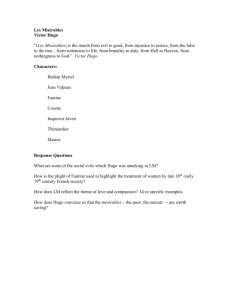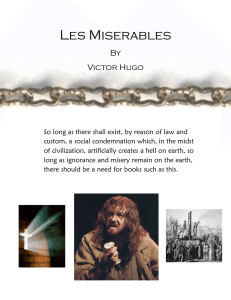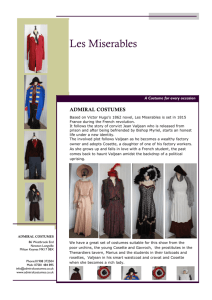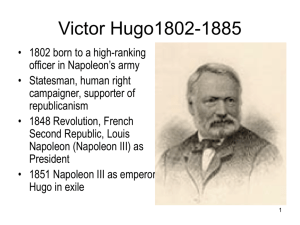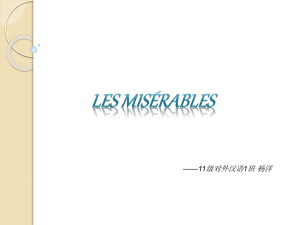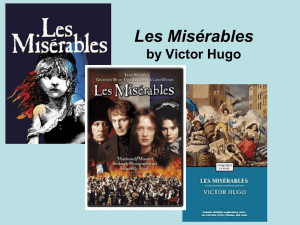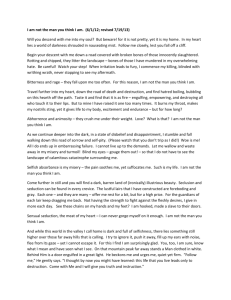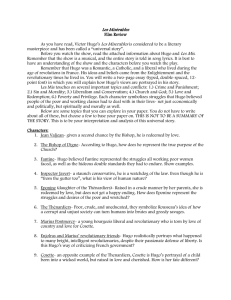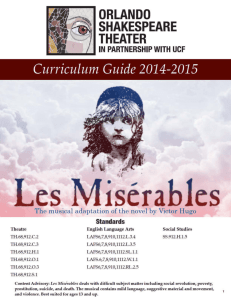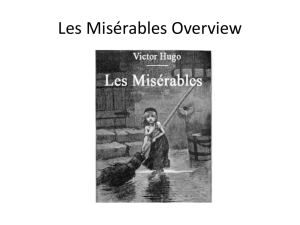File - Rachel Argueta
advertisement
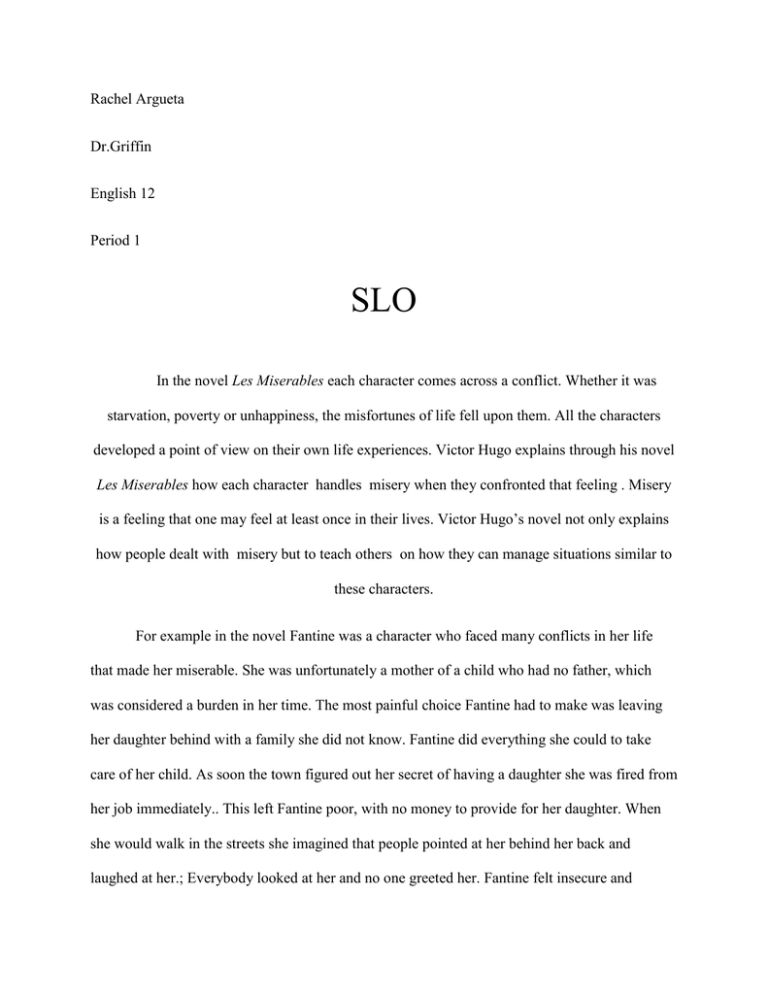
Rachel Argueta Dr.Griffin English 12 Period 1 SLO In the novel Les Miserables each character comes across a conflict. Whether it was starvation, poverty or unhappiness, the misfortunes of life fell upon them. All the characters developed a point of view on their own life experiences. Victor Hugo explains through his novel Les Miserables how each character handles misery when they confronted that feeling . Misery is a feeling that one may feel at least once in their lives. Victor Hugo’s novel not only explains how people dealt with misery but to teach others on how they can manage situations similar to these characters. For example in the novel Fantine was a character who faced many conflicts in her life that made her miserable. She was unfortunately a mother of a child who had no father, which was considered a burden in her time. The most painful choice Fantine had to make was leaving her daughter behind with a family she did not know. Fantine did everything she could to take care of her child. As soon the town figured out her secret of having a daughter she was fired from her job immediately.. This left Fantine poor, with no money to provide for her daughter. When she would walk in the streets she imagined that people pointed at her behind her back and laughed at her.; Everybody looked at her and no one greeted her. Fantine felt insecure and ashamed of herself. As said in the book “Little by little she learned her part. After two or three months she shook off her shame she went out holding her head up and wearing a bitter smile and felt that she was becoming shameless.” Fantine learned she would never be happy if she hid from the world miserably, she chose to go out and have a big smile on her face show the world she had no problems. Cosette is Fantines daughter, another character who was treated miserably as a child. As Cosette grew up in the house of the Thenardiess she was meantally abused. To them she was a slave and was treated like one. She was forced to clean their house; she was given rags as clothes and was fed under their kitchen table like a dog. All of Fantines money did not go to Cosette, but to the luxuries of the Thenardiess and their children. They did not care for Cosette. They would send her on errands such as retrieving water from the spring at night and knitting stockings for the little Thenardier. The one she dreaded the most was being sent to get water from the spring at night, she didn’t cope well with being in darkness The narrator describes how one would feel in complete darkness such as Cosette in this quote “Darkness makes the brain giddy. Man needs light; whoever plunges into the opposite of day feels his heart chilled. When the eye sees blackness the mind sees trouble”. Hugo describes how Cosette felt at that very moment walking through the woods. She was scared and sometimes peoples fear makes them see things in the darkness. Cosette in this situation closed her eyes tightly so she would not see anything and counted to ten to distract herself. “Her eye had become wild. She felt that perhaps she would be compelled to return there at the same hour the next night. Then by a sort of instinct to get out of this singular state, which she did not understand, but which terrified her she began to count aloud, one, two. Three, four, up to ten and when she was finished she began again.” Maruis was a very kind gentle man. He was one of those men that society envied. He had it all, the money, the family and a home. Marius like the rest encountered problems that left him battling them on his own. He eventually had to make a living out of what he had. Victor Hugo describes his living in this quote, “A horrible thing which includes days without bread, nights without sleep, evenings without a candle a health without a fire, weeks without labor, a future without hope, a coat out of elbows an old hat which makes young girls laugh, the door found shut against you at night because you have not paid your rent”. This quote describes what poverty brings to many people. Marius endured the life of a peasant and the misery that came along with it. He learned to eat once a day and to save money not for luxuries, but for more important things such as rent. All though Marius suffered from not eating a healthy diet or having a proper home he still had his faith. The author describes Marius in this quote “The first lad you meet, poor as he maybe, with his health his strength, his quick step, his shinning eyes, his blood which circulates warmly his black locks, his fresh cheeks his rosy lips, his white teeth, his white teeth his pure breath, will always be envied by an old emperor.” Maruis is described here as a poor man but has the most important qualities, his health and his life. The quote also described that he will be envied by people because he is still happy although he has nothing but himself. Other people will be confused and look at him with curiosity. They will not understand how someone who has nothing can still enjoy life meanwhile they have everything that anyone in the world could possibly have and not be happy as him. Victor Hugo created situations that people go through in today. It teaches everyone a lesson and how people could act upon certain conflicts or feelings. Misery is an emotion no one would like to face and this book can help people take precautions and avoid such experiences. Works cited Hugo, Victor. Les Miserables. France: Norte-Dame de Paris, 1931. Print
